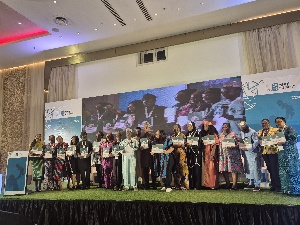Africa News of Friday, 16 May 2025
Source: www.ghanawebbers.com
Nigeria: Health Groups Confirm 58% Drop in Maternal Deaths in Two Nigerian States
Project Aisha Overview
Project Aisha is a maternal health initiative in Nigeria. It aims to reduce high maternal mortality rates and obstetric complications. The project is implemented by four organizations:
- Health Strategy and Delivery Foundation (HSDF)
- Ingress Health Partners
- mDoc Healthcare
- Institute for Healthcare Improvement (IHI)
The project has led to a 58% decline in maternal mortality rates. This achievement was reported across 32 health facilities in Lagos and Kaduna States.
Summit Highlights
The progress of Project Aisha was discussed at the Maternal Health Quality Improvement Summit. This event took place on Thursday in Lagos. Health experts, government officials, and partners attended the summit.
Muhammad Pate, the Coordinating Minister of Health, spoke about quality care's importance. He emphasized that quality care promotes maternal health equity.
Despite improvements, Nigeria's maternal mortality ratio remains high at 512 deaths per 100,000 live births as of 2018. Current figures for 2024 are still being analyzed.
Government Initiatives
Mr. Pate highlighted ongoing government efforts to reduce maternal mortality. The ministry is establishing maternal health centers with skilled workers and essential supplies.
He also mentioned advocating for family health departments at state levels. These departments will coordinate programs aimed at reducing maternal deaths effectively.
Financial protection mechanisms like community-based health insurance are also important. They help reduce out-of-pocket costs that prevent women from accessing care.
Project Achievements
Since its launch in September 2022, Project Aisha has supported over 200,000 women. It has improved access to quality maternal health services across 48 facilities.
Yewande Ogundeji from HSDF noted that traditional birth attendants have been engaged to fill community gaps. The project achieved a 25% reduction in facility-based maternal deaths.
There was also a 58% decline in deaths from severe pre-eclampsia and postpartum hemorrhage. Ms. Ogundeji raised questions about sustaining these gains long-term.
She stressed the need for alignment with national programs like NHIA's Comprehensive Emergency Obstetric Care scheme.
Proven Strategies
Orode Doherty from Ingress Health Partners discussed key components of the intervention. Improvements included better clinical decision-making and reduced waiting times for patients.
Ms. Doherty introduced the Change Package Document during the summit. This document contains proven interventions that can help reduce maternal deaths in any facility.
Ibrahim Mustafa from Lagos State Primary Health Care Board emphasized continuous quality improvement in healthcare delivery. He noted visible progress but stressed that it must be institutionalized within systems.
Collaboration Needed
Iyadunni Olubode from MSD for Mothers stated that tackling maternal mortality requires collaboration beyond government efforts alone. She highlighted Nigeria as one of the most dangerous places to give birth.
Sodzi Sodzi-Tettey, CEO of Ghana’s National Vaccine Institute, shared lessons from Africa on improving quality frameworks to combat maternal mortality effectively.
He pointed out successful strategies used in Mozambique and Ethiopia that led to declines in deaths due to targeted interventions addressing both medical causes and systemic challenges.











